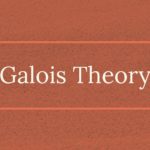Prove that $\F_3[x]/(x^2+1)$ is a Field and Find the Inverse Elements

Problem 529
Let $\F_3=\Zmod{3}$ be the finite field of order $3$.
Consider the ring $\F_3[x]$ of polynomial over $\F_3$ and its ideal $I=(x^2+1)$ generated by $x^2+1\in \F_3[x]$.
(a) Prove that the quotient ring $\F_3[x]/(x^2+1)$ is a field. How many elements does the field have?
(b) Let $ax+b+I$ be a nonzero element of the field $\F_3[x]/(x^2+1)$, where $a, b \in \F_3$. Find the inverse of $ax+b+I$.
(c) Recall that the multiplicative group of nonzero elements of a field is a cyclic group.
Confirm that the element $x$ is not a generator of $E^{\times}$, where $E=\F_3[x]/(x^2+1)$ but $x+1$ is a generator.
Sponsored Links
Contents
Proof.
(a) Prove that the quotient ring $\F_3[x]/(x^2+1)$ is a field
Let $f(x)=x^2+1$. We claim that the polynomial $f(x)$ is irreducible over $\F_3$.
To see this, note that $f(x)$ is a quadratic polynomial.
So $f(x)$ is irreducible over $\F_3$ if it does not have a root in $\F_3$.
We have
\begin{align*}
f(0)=1, \quad f(1)=2, \quad f(2)=2^2+1=2 \text{ in } \F_3.
\end{align*}
Hence $f(x)$ does not have a root in $\F_3$ and it is irreducible over $\F_3$.
It follows that the quotient $\F_3[x]/(x^2+1)$ is a field.
Since $x^2+1$ is quadratic, the extension degree of $\F_3[x]/(x^2+1)$ over $\F_3$ is $2$.
Hence the number of elements in the field is $3^2=9$.
(b) Find the inverse of $ax+b+I$
Let $ax+b$ be a representative of a nonzero element of the field $\F_3[x]/(x^2+1)$.
Let $cx+d$ be its inverse. Then we have
\begin{align*}
1&=(ax+b)(cx+d)=acx^2+(ad+bc)x+bd\\
&=(ad+bc)x+bd-ac
\end{align*}
since $x^2=-1$ in $\F_3[x]/(x^2+1)$.
Hence we obtain two equations
\begin{align*}
ad+bc=0 \text{ and } bd-ac=1.
\end{align*}
Since $ax+b$ is a nonzero element, at least one of $a, b$ is not zero.
If $a\neq 0$, then the first equation gives
\[d=-\frac{bc}{a}. \tag{*}\]
Substituting this to the second equation, we obtain
\begin{align*}
\left(\, \frac{-b^2-a^2}{a} \,\right)c=1.
\end{align*}
Observe that $a^2+b^2$ is not zero in $\F_3$.
(Since $a \neq 0$, we have $a^2=1$. Also $b^2=0, 1$.)
Hence we have
\begin{align*}
c=-\frac{a}{a^2+b^2}.
\end{align*}
It follows from (*) that
\[d=\frac{b}{a^2+b^2}\]
Thus, if $a \neq 0$, then the inverse element is
\[(ax+b)^{-1}=\frac{1}{a^2+b^2}(-ax+b). \tag{**}\]
If $a=0$, then $b\neq 0$ and it is clear that the inverse element of $ax+b=b$ is $1/b$.
Note that the formula (**) is still true in this case.
In summary, we have
for any nonzero element $ax+b$ in the field $\F_3[x]/(x^2+1)$.
(c) $x$ is not a generator but $x+1$ is a generator
Note that the order of $E^{\times}$ is $8$ since $E$ is a finite field of order $9$ by part (a).
We compute the powers of $x$ and obtain
\begin{align*}
x, \quad x^2=-1, \quad x^3=-x, \quad x^4=-x^2=1.
\end{align*}
Thus, the order of the element $x$ is $4$, hence $x$ is not a generator of the cyclic group $E^{\times}$.
Next, let us check that $x+1$ is a generator.
We compute the powers of $x+1$ as follows.
\begin{align*}
&x+1, \quad (x+1)^2=x^2+2x+1=2x, \\
&(x+1)^3=2x(x+1)=2x^2+2x=2x-2=2x+1\\
&(x+1)^4=(2x+1)(x+1)=2x^2+3x+1=2.
\end{align*}
Observe that at this post the order of $x+1$ must be larger than $4$.
Since the order of $E^{\times}$ is $8$, the order of $x+1$ must be $8$ by Lagrange’s theorem.
Just for a reference we give the complete list of powers of $x+1$.
\[\begin{array}{ |c|c|}
\hline
n & (x+1)^n \\
\hline
1 & x+1 \\
2 & 2x \\
3 & 2x+1 \\
4 & 2 \\
5 & 2x+2\\
6 & x\\
7 &x+2\\
8 & 1\\
\hline
\end{array}\]
 Add to solve later
Add to solve later
Sponsored Links













